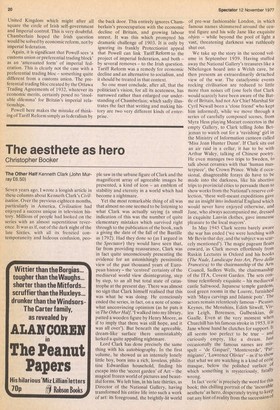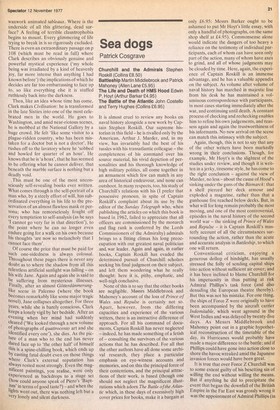The aesthete as hero
Christopher Boolcer
The Other Half Kenneth Clark (John Murray £6.50) Seven years ago, I wrote a longish article in these columns about Kenneth Clark's Civilisation. Over the previous eighteen months, particularly in America, Civilisation had enjoyed a success unique in television history. Millions of people had looked on the series with an almost superstitious reverence. It was as if, out of the dark night of the late Sixties, with all its frenzied contemporaneity and hideous confusion, peo pie saw in the urbane figure of Clark and the magnificent array of agreeable images he presented, a kind of icon — an emblem of stability and eternity in a world which had become a nightmare.
Yet the most remarkable thing of all was that almost no one seemed to be listening to what Clark was actually saying (a small indication of this was the number of quite elementary mistakes which survived right through to the publication of the book, such a giving the date of the fall of the Bastille as 1792). Had they done so (as I argued in the Spectator) they would have seen that, far from providing reassurance, Clark was in fact quite unconsciously presenting the evidence for an astonishingly pessimistic view of the past thousand years of European history — the 'centred' certainty of the mediaeval world view disintegrating, step by step, to an all but total state of catastrophe at the present day. There was almost no sign that Clark himself realised that this was what he was doing. He consciously ended the series, in fact, on a note of somewhat unconvincing optimism (as he puts it in The Other Half, 'I walked into my library, patted a wooden figure by Henry Moore, as if to imply that there was still hope, and it was all over'). But beneath the agreeable, dream-like' surface there unmistakably lurked a quite appalling nightmare.
Lord Clark has done precisely the same thing with his autobiography. In the first volume, he showed us an intensely lonely little boy, born into a rich, loveless, philistine Edwardian household, finding his escape into the 'secret garden' of Art — the magical frozen world of pictures and beautiful forms. We left him, in his late thirties, as Director of the National Gallery, having transformed his entire life into such a work of art: its foreground, the brightly-lit world of pre-war fashionable London, in which famous names shimmered around the central figure and his wife Jane like exquisite objets — while beyond the pool of light a vast, threatening darkness was ruthlessly shut out.
We take up the story in the second volume in September 1939. Having stuffed away the National Gallery's treasures like a Nibelungen hoard into a Welsh cave, he then presents an extraordinarily detached view of the war. The cataclysmic events rocking civilisation are reduced to little more than noises off (one feels that Clark would scarcely have been aware of the Battle of Britain, had not Air Chief Marshal Sir Cyril Newall been a 'close friend' who kept him informed), while we move through a series of carefully composed scenes, from Myra Hess playing Mozart concertos in the empty Gallery, to Clark telling John Betjeman to watch out for a 'ravishing' girl in the Ministry of Information canteen called 'Miss Joan Hunter Dunn'. If Clark sits out an air raid in a cellar, it has to be with. Arthur Waley, talking of Chinese poetry. He even manages two trips to Sweden, to talk about ceramics with that 'human masterpiece', the Crown Prince. While if occasional, disagreeable forays do have to be made into the darkness, like his abortive trips to provincial cities to persuade them to show works from the National's reserve collection; 'these well-meant expeditions gave me an insight into industrial England which would never have enjoyed otherwise, and Jane, who always accompanied me, dressed in exquisite Lanvin clothes, gave immense pleasure to the local mayors'. In May 1945 Clark seems barely aware the war has ended ('we were lunching with Mr Bevin that day, and the subject was scarcely mentioned'). The magic pageant floats onward, 'as Clark moves effortlessly from Ruskin Lectures in Oxford and his books (The Nude, Landscape Into Art, Piero della Francesca) to the chairmanship of the Arts Council, Sadlers Wells, the chairmanship of the ITA, Covent Garden. The sets continue relentlessly exquisite — his mediaeval castle Saltwood, Japanese temple gardens, cool green rooms in the Louvre, furnished with 'Maya carvings and Islamic pots'. The actors remain relentlessly famous — Picasso, Keynes, the Menuhins, Edith Sitwell, Vivien Leigh, Berenson, Gulbenkian, de Gaulle. Even at the very moment when Churchill has his famous stroke in 1953, it is Jane whose hand he clutches for support. It all seems too perfect to be true — and curiously empty, like a dream. Just occasionally the famous names are mis' spelt — 'de Gaspari', `Monteverde', Tarmigiano', 'Lawrence Olivier' — as if to show that what we are watching is a kind of eeric, masque, below the polished surface cn which something is mysteriously, fatallY wrong. In fact 'eerie' is precisely the word for this book; this chilling portrait of the 'incurable aesthete' as hero, desperately trying to keel?, out any hint of reality from the succession 01 waxwork animated tableaux. Where is the underside of all this glittering, dead surface? A feeling of terrible claustrophobia begins to mount. Every glimmering of life trying to break in is so rigorously excluded. There is even an extraordinary passage on p 108 (which must be read in full) where Clark describes an obviously genuine and powerful mystical experience ('my whole being was irradiated by a kind of heavenly joy, far more intense than anything I had known before') the implications of which he decides are far too embarrassing to face up to, so like everything else it is stuffed ruthlessly back into the darkness.
Then, like an idea whose time has come, Clark makes Civilisation: he is transformed in the late Sixties into one of the most celebrated men in the world. He goes to Washington, and amid near-riotous scenes, he is mobbed at the National Gallery by a huge crowd. He felt 'like some visitor to a plague-ridden country, who has been mistaken for a doctor but is not a doctor'. He rushes off to the lavatory where he 'sobbed and howled for quarter of an hour'. He knows that he is 'a hoax', that he has seemed to be offering what he cannot deliver, that beneath the marble surface is nothing but a deadly void.
,This must be one of the most unconsciously self-revealing books ever written. What comes through is the self-portrait of a man who, by a steely effort of will, has subordinated everything in his life to the preservation of an almost flawless mask or persona; who has remorselessly fought off every temptation to self-analysis (as he says '1 cannot go very far in that direction"), to the point where he can no longer even endure going for a walk on his own because his thoughts 'are now so melancholy that I cannot face them'.
Of course the price that must be paid for such one-sidedness is always colossal. Throughout these pages there is never any doubt as to where the shadow from all this relentless artificial sunlight was falling — on his wife Jane. Again and again she is said to be suffering _ from mysterious illnesses. Finally, after an almost Gotterdantnerunglike scene in Palermo (where the book becomes remarkably like sonic major tragic novel), Jane collapses altogether. For three Years, while she is barely conscious, Clark keeps a lonely vigil by her bedside. After an evening when her mind had suddenly cleared ('We looked through a new volume of photographs of quattrocento art and she identified every one'), she dies. As the picture of a man who to the end has never dared face up to 'the other half of himself this is a spine-chilling book, which ends up by casting fatal doubt even on those things Where Clark's external reputation has always rested most strongly. Even the magnificent paintings, you realise, were only experienced as backdrops to a stage set (how could anyone speak of Piero's 'Baptism' in terms of good taste?) — and when the lights went out, there was nothing left but a very lonely and silent darkness.



































 Previous page
Previous page